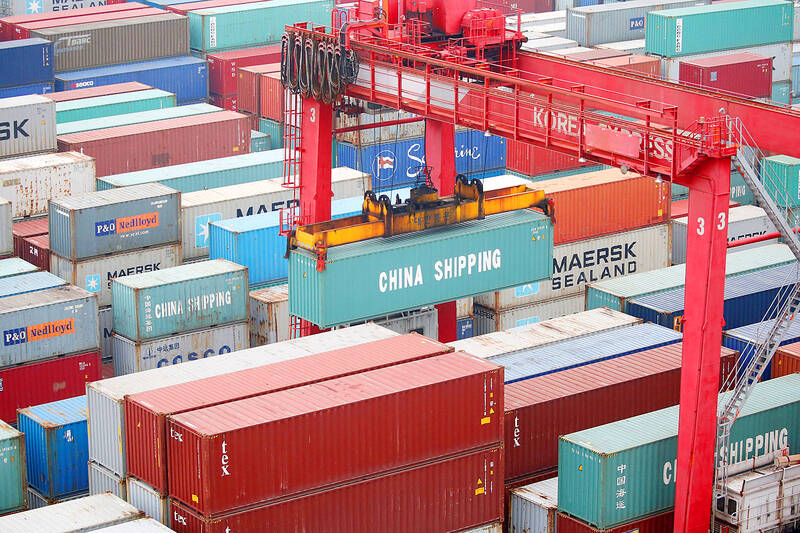South Korea’s exports maintained growth momentum last month as demand from China increased and semiconductor sales stayed resilient.
The value of shipments adjusted for working-day differences increased 4.3 percent from a year earlier last month, according to data released yesterday by the South Korean Ministry of Trade, Industry and Energy. That compared with a 3.7 percent rise initially reported for the full month of November.
Unadjusted exports rose 6.6 percent while overall imports increased by 3.3 percent, resulting in a trade surplus of US$6.5 billion.

Photo: Reuters
The up-tick offers some solace for a nation undergoing its biggest political upheaval in years. South Korean President Yoon Suk-yeol was impeached after shocking the nation by briefly declaring martial law on Dec. 3. South Korean Prime Minister Han Duck-soo was also impeached for refusing to quickly appoint judges to deliberate on Yoon’s impeachment. South Korean Minister of Finance Choi Sang-mok has stepped in as the second acting president.
The turmoil has sent the won to its lowest level since 2009, while South Korea’s stock markets also remain fragile. A Jeju Air plane crash on Sunday that killed all but two of 181 people on board might further dent consumer sentiment.
South Korea, which relies heavily on exports to drive its economic growth, also faces external challenges. US president-elect Donald Trump has promised an array of protectionist policies, including universal tariffs, as he prepares to return to the White House.
Bank of Korea Governor Rhee Chang-yong sees the economy growing this year less than the 1.9 percent forecast previously, and economists increasingly expect the central bank would go ahead with another cut this month as consumer and business confidence slump.
Weaker export momentum poses a threat to the won, and the nation’s semiconductor industry might experience slower demand this year after enjoying a boom from artificial intelligence development.
Chip exports increased 31.5 percent from a year earlier last month while shipments of cars fell 5.3 percent. Sales of wireless communication devices rose 16.1 percent, the trade ministry said.
Exports to China increased 8.6 percent, reversing from a contraction a month earlier, the ministry said. Shipments to the US rose 5.5 percent and exports to the EU advanced 15.1 percent.
For the year as a whole, South Korea’s exports rose 8.2 percent last year from a year earlier, the ministry said, adding that the trade surplus amounted to US$51.8 billion. Semiconductors, the biggest driver of exports, sold 43.9 percent more than in 2023, it said.
The outlook for this year is less bright. Exports are likely to grow 2.2 percent from a year earlier, while the trade surplus is set to reduce to US$48.7 billion, the Korea Development Institute said in a November forecast.

STEEP DECLINE: Yesterday’s drop was the third-steepest in its history, the steepest being Monday’s drop in the wake of the tariff announcement on Wednesday last week Taiwanese stocks continued their heavy sell-off yesterday, as concerns over US tariffs and unwinding of leveraged bets weighed on the market. The benchmark TAIEX plunged 1,068.19 points, or 5.79 percent, to 17,391.76, notching the biggest drop among Asian peers as it hit a 15-month low. The decline came even after the government on late Tuesday authorized the NT$500 billion (US$15.2 billion) National Stabilization Fund (國安基金) to step in to buoy the market amid investors’ worries over tariffs imposed by US President Donald Trump. Yesterday’s decline was the third-steepest in its history, trailing only the declines of 2,065.87 points on Monday and

TAKING STOCK: A Taiwanese cookware firm in Vietnam urged customers to assess inventory or place orders early so shipments can reach the US while tariffs are paused Taiwanese businesses in Vietnam are exploring alternatives after the White House imposed a 46 percent import duty on Vietnamese goods, following US President Donald Trump’s announcement of “reciprocal” tariffs on the US’ trading partners. Lo Shih-liang (羅世良), chairman of Brico Industry Co (裕茂工業), a Taiwanese company that manufactures cast iron cookware and stove components in Vietnam, said that more than 40 percent of his business was tied to the US market, describing the constant US policy shifts as an emotional roller coaster. “I work during the day and stay up all night watching the news. I’ve been following US news until 3am

Six years ago, LVMH’s billionaire CEO Bernard Arnault and US President Donald Trump cut the blue ribbon on a factory in rural Texas that would make designer handbags for Louis Vuitton, one of the world’s best-known luxury brands. However, since the high-profile opening, the factory has faced a host of problems limiting production, 11 former Louis Vuitton employees said. The site has consistently ranked among the worst-performing for Louis Vuitton globally, “significantly” underperforming other facilities, said three former Louis Vuitton workers and a senior industry source, who cited internal rankings shared with staff. The plant’s problems — which have not

TARIFF CONCERNS: The chipmaker cited global uncertainty from US tariffs and a weakening economic outlook, but said its Singapore expansion remains on track Vanguard International Semiconductor Corp (世界先進), a foundry service provider specializing in producing power management and display driver chips, yesterday withdrew its full-year revenue projection of moderate growth for this year, as escalating US tariff tensions raised uncertainty and concern about a potential economic recession. The Hsinchu-based chipmaker in February said revenues this year would grow mildly from last year based on improving supply chain inventory levels and market demand. At the time, it also anticipated gradual quarter revenue growth. However, the US’ sweeping tariff policy has upended the industry’s supply chains and weakened economic prospects for the world economy, it said. “Now